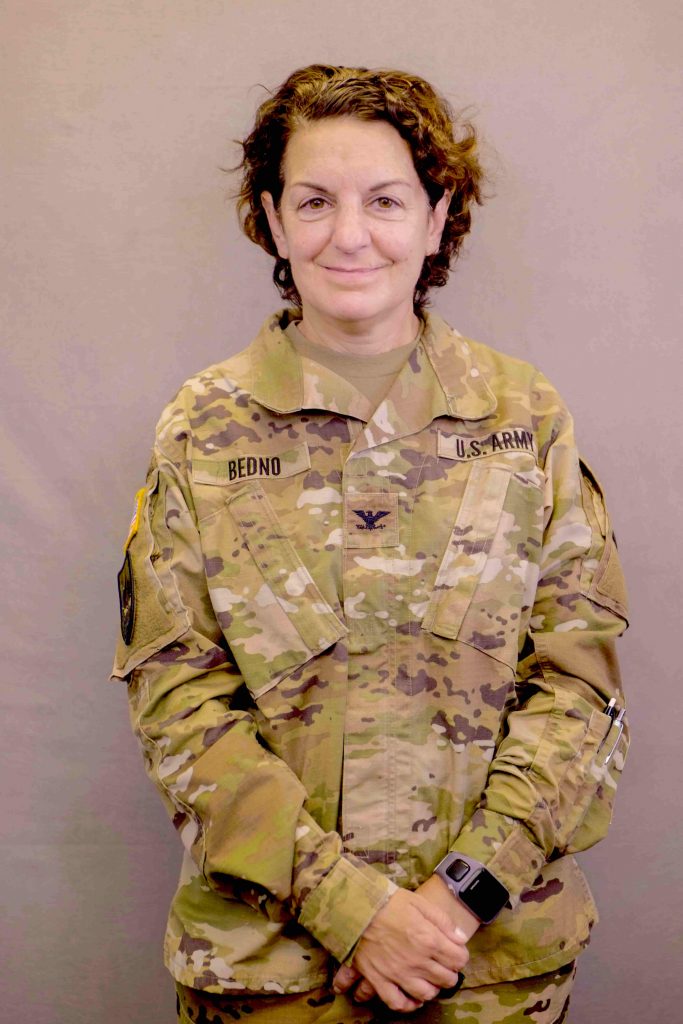A strategic partnership between UNC Lineberger, Fort Bragg Department of Public Health, and the Cumberland County health department is helping the nation’s largest Army base rework its tobacco policies and take steps to improve the health of its soldiers and their families.

“Most of our beneficiaries and all of our civilian workforce live off-post and are not on Fort Bragg proper, so it was critical to develop relationships within the community,” said Col. Sheryl A. Bedno, MD, DrPH, director of the Department of Public Health at Fort Bragg. “What’s really exciting is that now, instead of people working on overlapping projects, we are working on these efforts together. A lot has happened in this short amount of time, and it’s really changed the way we’ve done public health.”
The Partnership for a Fort Bragg Tobacco-Free Community was launched in 2018, after a delegation from Fort Bragg came to Chapel Hill and met UNC Lineberger’s Kurt M. Ribisl, PhD, a tobacco control policy expert and chair of the department of health behavior at the UNC Gillings School of Global Public Health.
“I was looking for an opportunity to do something with our military in North Carolina, which is the most military-friendly state in the country,” said Ribisl, who had been working with the Air Force and the University of Virginia on a parallel tobacco control project, “and after the initial meeting, we started brainstorming and talking about projects we could do together at Fort Bragg.”
Impact of tobacco use in the U.S. Army
According to the U.S. Army Public Health Center’s 2019 Health of the Force report, 28% of Fort Bragg soldiers self-reported use of at least one tobacco product in the past 30 days before their annual health examination.

Studies show that tobacco use affects combat readiness by contributing to, for example, greater injury risk, poorer wound healing and worse night vision.
Military personnel who use tobacco have worse physical and mental health and are at greater risk of early discharge compared to their non-smoking colleagues. Annually, the Department of Defense spends more than $1.6 billion on health costs and lost productivity due to tobacco-related health issues.
Project goals
The University Cancer Research Fund supported the startup of the collaboration, which has since received additional grant funds from the Centers for Disease Control’s Tobacco Prevention and Control branch. Their goal is to make policy changes and education work to lower tobacco use by Fort Bragg soldiers and their families from 26% to 17% by 2025.
Early results of the partnership’s efforts have been significant – helping to leverage the additional grant funding, generating three abstracts that were accepted at the 2020 Annual Convention of the American Public Health Association, and leading to the development of the Tobacco Cessation and Prevention Fort Bragg Strategic Plan.

The partnership is also working toward a formalized public health practicum program between UNC Gillings and the Fort Bragg Department of Public Health.
“Colonel Bedno has been so enthusiastic and willing to partner,” said Hannah Prentice-Dunn, MPH, project manager of UNC Lineberger’s Cancer Prevention and Control Program. “It is a strategic move to bring state and local health experts to the table to help the soldiers at Fort Bragg, and she really opened the doors for all of this to happen.”
The UNC Lineberger partnership has enabled further ongoing collaboration with the Fort Bragg public health team and their response to COVID-19 that has so affected all aspects of health.
